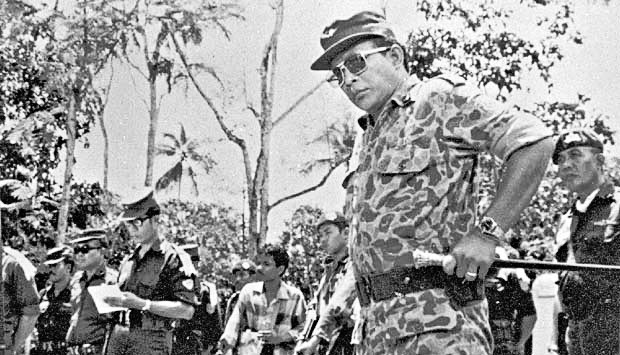Popular Reads
Top Results
Can't find what you're looking for?
View all search resultsPopular Reads
Top Results
Can't find what you're looking for?
View all search resultsThe ‘PKI coup’ was the Cold War’s turning point
Latief was adamant: the plan was to kidnap the generals and to arraign them before Soekarno; killing was not on the agenda.
Change text size
Gift Premium Articles
to Anyone
W
inston Lord is rarely linked with the historic meeting 50 years ago between Chinese Communist Party chairman Mao Zedong and United States president Richard Nixon, but as national security adviser Henry Kissinger’s aide Lord was there too (see “Interview with Winston Lord”, nsarchive2.gwu).
Nor do we remember Lord’s praise for Marshall Green, US ambassador to Indonesia from 1965-69, who was part of the 13-member US delegation to Beijing. “The expertise and support for the opening of China,” Lord explained discretely to US media in February 1972, was actually the work of Green in Indonesia in the 1960s.
“We could deal with China because the former Communist Bloc was no longer a bloc,” Lord explained. Green’s role in Indonesian regime change was crucial. He was in constant, surreptitious contact with Soeharto via Adam Malik from 1965-66. Green’s help in destroying the Indonesian Communist Party (PKI) was driven by the effect it would have on widening the Sino-Soviet split.
Green implemented a strategy of “driving a wedge between Moscow and Beijing” first proposed by then-director of the Central Intelligence Agency (CIA), Allen Dulles, and Kissinger, when part of the Rockefeller brothers panel in the late 1950s.
Indonesia’s strategic role is still not “generally recognized” in Australia, let alone in the US where only about 10 percent of the populace is even aware of Indonesia. The key to understanding 1965 is the composition of the “30 September Movement” – the group accused of killing six generals in Jakarta – because more than just troops from the presidential detail (Cakrabirawa) and battalions 454 and 530 were involved.
In subsequent military trials, three persons were named the principal figures behind this “movement”. Of the two army officers, Lt. Col. Untung and Col. Abdul Latief, the former was executed and the latter I interviewed in Cipinang Prison in East Jakarta in 1998, his 33rd year behind bars. The third person was a civilian named Sjam who had known Soeharto for 20 years.
In 1965, Sjam’s ID gave him free access to Soeharto, head of the Army Strategic Reserve Command (Kostrad), but at the same time, Sjam was also working secretly under PKI head Aidit. Sjam’s “evidence” and corroboration with Soeharto led to the accusation that the PKI had planned not only the death of the generals but also an attempted a coup against Sukarno.


















